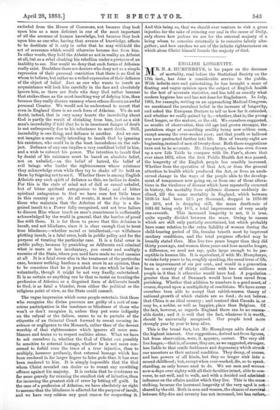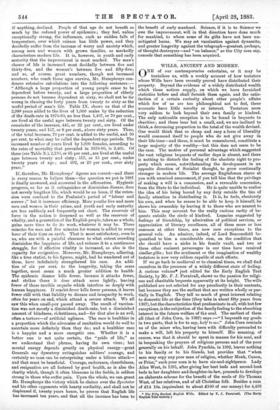ENGLISH LONGEVITY.
1% R. N. A. HUMPHREYS, in his paper on the decrease of mortality, read before the Statistical Society on the.. 17th inst., has done a considerable service to the public... Withinfinite care and painstaking, he has brought a mass of floating and vague opinion upon the subject of English health to the test of accurate statistics, and has told us exactly what modern hygiene has and has not done for Englishmen. In July, 1881, for example, writing on an approaching Medical Congress, we mentioned the prevalent belief in the increase of longevity, and asked the European Doctors to tell us how far it extended, and whether we really gained by it,—whether, that is, the young • lived longer, or the mature, or the old. We ourselves suggested, as results of observation, that old age had grown stronger, the . pantaloon stage of mumbling senility being now seldom seen, except among the over-worked poor; and that youth or ladhood4 was now protracted further into life. Men of twenty-eight are beginning, instead of men of twenty-four. Both those suggestions turn out to be accurate. Mr. Humphreys, who has even drawn up a new Life Table to compare with Dr. Farr's, shows that ever since 1872, when the first Public Health Act was passed, the longevity of the English people has sensibly increased. Whether from the operation of that Act, or from the general attention to health which produced the Act, or from an unob- served change in the ways of the people akin to the develop- ment of temperance now going on, or from one of those altera- tions in the virulence of disease which have repeatedly occurred in history, the mortality from epidemic diseases suddenly de- clined, till the mean mortality in England, which between 1838-54 had been 22-5 per thousand, dropped in 1876-80 to 20.8, and is dropping still, the mean death-rate of 1881-82 being only 19.3, a total improvement of very nearly one-seventh. This increased longevity is not, it is true, quite equally divided between the sexes. Owing to causes which are still only partially ascertained, but which probably have some relation to the extra liability of women during the child-bearing period of life, females benefit most by improved sanitary conditions, and the total progress effected may be broadly stated thus. Men live two years longer than they did thirty years ago, and women three years and four months longer, a difference, we need not say, quite large enough to be per- ceptible in human life. It is equivalent, if with Mr. Humphreys, . we take forty years to be, roughly speaking, the usual term of life, to an improvement of six per cent., and would in a generation • , leave a country of thirty millions with two millions more people in it than it otherwise would have had. A population greater than that of Denmark would have been saved from perishing. Whether that addition to numbers is a good must, of course, depend upon a multiplicity of conditions. We have never ourselves been able to accept that rabbit-warren theory of national growth of which statists are so fond ; do not believe that China is an ideal country ; and contend that Canada is, may be, a nobler, as well as happier, place than Belgium. Of the fact, however, as regards England there can be no reason- able doubt; and it is well that the fact, whatever it is worth,. should be universally recognised. Our people tend more strongly year by year to keep alive.
This is the broad fact, but Mr. Humphreys adds details of .
the highest interest. Our suggestions, derived not from figures, , but from observation, were, it appears, correct. The very old live longer,—that is, of course, they are, as we suggested, stronger, leas liable to that senile feebleness and degeneracy which struck our ancestors as their natural condition. They decay, of course, and lose powers of all kinds, but they no longer sink into a second childhood; but, except when over-worked, die, so to speak, • standing, as only heroes used to do. We see men and women now-a-days over eighty with all their faculties intact, able to con- verse, to eat well, and to walk, and with a decided and admitbe& influence on the affairs amidst which they live. This is the moss, striking, because the increased longevity of the very age& is milts sharedhy the old. Both in men and women, the chance of survival, .., between fifty-five and seventy has not increased, but has rather r■ if anything, declined. People of that age do not benefit so much by the reduced power of epidemics ; they feel, unless exceptionally strong, the influences, such as sudden falls of temperature, over which science has little power, and they decidedly suffer from the increase of worry and anxiety which, among men and women with grown families, so markedly characterises modern life. It is, however, in youth and early maturity that the improvement is most marked. The man's chance of life is increased most decidedly between five and thirty-five, and the woman's between five and fifty-five; and as, of course, great numbers, though not increased numbers, who reach those ages survive, Mr. Humphreys con- denses extensive calculations into the following sentences :— " Although a large proportion of young people cease to be dependent before twenty, and a large proportion of elderly persons do not become dependent at sixty, we shall not be far wrong in classing the forty years from twenty to sixty as the useful period of man's life. Table IX. shows us that of the 2,009 years added to the lives of 1,000 males by the reduction of the death-rate in 1876-80, no less than 1,407, or 70 per cent., are lived at the useful ages between twenty and sixty. Of the remainder of the increase, 445, or 22 per cent., are lived under twenty years; and 157, or 8 per cent., above sixty years. Thus, of the total increase, 70 per cent. is added to the useful, and 30 per cent. to what may be called the dependent-age periods. The increased number of years lived by 1,000 females, according to the rates of mortality that prevailed in 1876-80, is 3,405. Of these (see Table X.), 2,196, or 65 per cent., are lived at the useful ages between twenty and sixty ; 517, or 15 per cent., under twenty years of age ; and 692, or 20 per cent., over sixty years."
If, therefore, Mr. Humphreys' figures are correct—and there is every reason to believe them—the question we put in 1881 is finally answered, and answered in the affirmative. Hygienic progress, so far as it extinguishes or diminishes disease, does not merely lengthen life, which would be no boon, if the exten- sion were confined to the Psalmist's period of "labour and sorrow ;" but it increases efficiency. More youths live and more men and women in their prime, and youth and early maturity are less suddenly and frequently cut short. The reservoir of force in the nation is deepened as well as the reservoir of vitality, and a generation of the English people, taken as a whole, gains more time to do its work, whatever it may be. Three minutes for men and five minutes for women is added to every hour of their tinie on earth. That is most satisfactory, even to us, who see with a painful clearness to what extent crowding diminishes the happiness of life, and reduces it to a continuous struggle, for if effective vitality is increased, so also is the capacity for emigration. Moreover, Mr. Humphreys, adhering, like a true statist, to his figures, might, had he wandered out of them, have indefinitely strengthened his case. An addi- tion of six per cent. to the longevity, taking the sexes together, must mean a much greater addition to health The epidemic disease kills fewer, because it attacks fewer, and strikes those it does attack more lightly, leaving fewer of those terrible sequelte which interfere so deeply with human happiness. If scarlet-fever kills fewer persons, it leaves fewer still with that liability to disease and incapacity to work, often for years on end, which attend a severe attack. We all saw this when small-pox passed • away. The result of vaccina- tion was not merelya diminished death-rate, but a diminished amount of blindness, rickettiness, and—for that also is an evil, often a torture—of artificial ugliness. The race is healthier in a proportion which the advocates of sanitation would do well to ascertain more definitely than they do ; and a healthier race is a happier and a more energetic one. Whether it is a better one is not quite certain, the "pride of life," as we understand that phrase, having its own vices; but mental energy depends greatly on physical energy—great Generals say dysentery extinguishes soldiers' courage, and certainly no man can be enterprising under a bilious attack— and that must be beneficial. Courage, endurance, cheerfulness, and resignation are all fostered by good health, as is also the charity which, though it often blossoms in the feeble, is seldom strong in those who suffer pain. Upon the whole, we can grant Mr. Humphreys the victory which he claims over the Spectator and his other opponents with hearty cordiality, and shall not be displeased if, twenty years hence, he proves that English life has increased ten years, and. that all the increase has been to
the benefit of early manhood. Science, if it is to Science we owe the improvement, will in that direction have done much for mankind, to whom some of its gifts have not been un- mitigated boons. We may set vaccination against dynamite, and greater longevity against the telegraph—greatest, perhaps, of thought-destroyers—and "on balance," as the City men say, concede that something has been acquired.



































 Previous page
Previous page